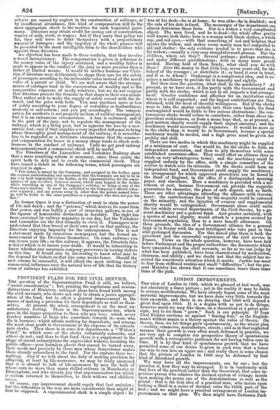oidents are caused by neglect in the construction of railways,
or by insufficient attendance, this kind of compensation will be the most appropriate check to the motives for such homicidal parsi- mon'. Directors may obtain credit for saving out of construction, repairs of rails, stock, or wages ; but if they carry that policy too far, they will have to debit themselves with a proportionate amount of damages ; and the impolicy of the whole process will be presented in the most intelligible form to the shareholders who appoint those directors. An objection has been made to these verdicts, that they involve a moral moonsistency. The compensation is given in reference to the money value of the injury sustained, and a wealthy father is made to appear in the verdict of the jury as more precious than a father of limited means. It would be neither humane nor Chris- tian if directors were deliberately to shape their care for the safety of passengers according to the mercantile value instead of the moral value of a parent or child. We are well aware that the arrange- ments of carriages tend to the conservation of wealthy and to the comparative exposure of needy relatives ; but we do not suppose that directors present the formula in that shape to their own minds. They rather seek to make the supply of safety accord with the de- mand, and the price with both. You may purchase more or less of safety according to your degree of cowardice or foolhardiness, modesty or self-esteem ; and you pay accordingly. The compen- sation for accidents is not properly an item of railway management, but it is an extraneous circumstance. A loss is sustained, and it is the part of the jury, not to regulate the management of the railway, which is a thing past, but to appraise the loss by a mer- cantile test ; and if that supplies a very imperfect influence to bring about thoroughly good management of the railway, it is neverthe- less to be regarded as a fortunate circumstance that the commer- cial compensation for losses in a money shape tends to check reck- lessness in the conduct of railways. Until we get good railway management,nuch a commercial check will be useful. The Directors of the Lancashire and Yorkshire Railway show that a more searching reform is necessary, since there exists the spirit both to defy and to evade the commercial check. They have issued a ticket in the following terms, which passengers are required to sign-
" This ticket is issued by the Company, and accepted by the holder, upon the express understanding and agreement that the Company are not to be in any way held responsible to the holder, or his representatives, for the conse- quences of any accident, however caused, which may happen to the holder while travelling in any of the Company's vehicles, or being at any of the Company's stations. It must be exhibited to the Company's officers when- ever required ; and any person using it, other than the person named here- in, will be liable to the same penalties as a passenger who does not pay his fare."
In former times it was a distinction of rank to claim the power of life and death ; and the " potence," which derives its name from that power, and was bodily a sort of cross-tree gallows, is one of the figures of honourable distinction in heraldry. The right has been exercised by railway magnates in our day, but the Yorkshire and Lancashire are the first formally to claim it. Passengers now understand that they travel at their own peril on that railway, the Directors enjoying impunity for the consequences. This is not a statement made by censorious newspapers, but the formal an- nouncement of the Dii ectors themselves. On some railways you can insure your life ; on this railway, it appears, the Directors take a ticket which is to insure your death. It would be interesting to know whether any assurance company perseveres in issuing tickets on this line. It would also be interesting to know what may be the demand for tickets on that line some weeks hence. Should the new scheme be successful, it will afford the most striking case of commercial influences over the natural love of life that the history even of railways has exhibited.
























 Previous page
Previous page